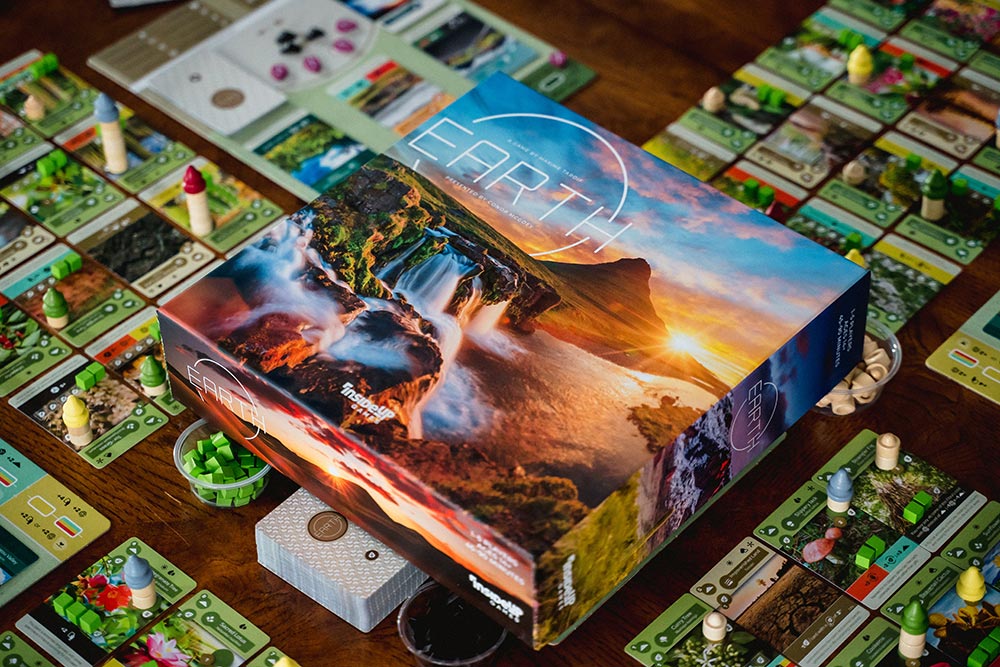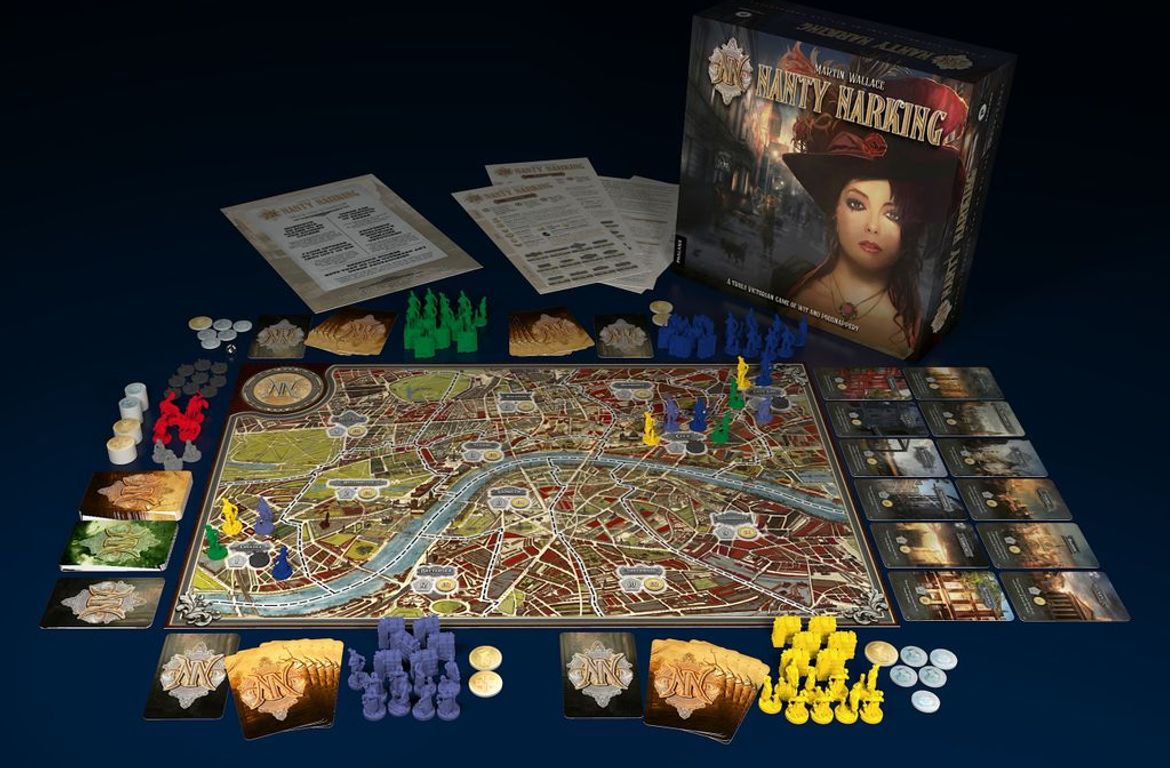
Earth: Istražite Prirodna Čuda planete Zemlje kroz Društvenu Igru
U svijetu društvenih igara, Earth se ističe kao igra koja kombinira ekološku svjesnost, strategiju i prekrasnu umjetnost. Ako ste ljubitelj
by Geonil B
During the more than five years that I have been designing board games, I have submitted a card game (usually a trick-taking game) at Korean board game fairs almost every year. In the fall of 2018, I was also thinking about which new game to submit to a board game fair. Since I was quite happy with the two-player game that I had made before, I tried to make another two-player tug-of-war style game. At the subway station on my way home from a weekly meeting where amateur game designers tested games together, I overheard a student who was on the phone swearing about his homeroom teacher: “Oh, I’m so annoyed. My teacher is Jekyll and Hyde!” At that moment, I decided that the theme of my new game would be the struggle between Dr. Jekyll and Mr. Hyde.
Since a game is much more than just a theme, I started to think about how it would work. A few months previously, I had played The Fox in the Forest and Claim, and I felt that two-player trick-taking games were very appealing, so I wanted my new game to be a tug-of-war style game with an object that could move back and forth across a certain line. Also, I thought it would be better to make the game asymmetrical because of Dr. Jekyll and Mr. Hyde’s different dispositions.
While I had decided that it would definitely be a two-player trick-taking game with asymmetric roles, I was still thinking about the logistics of the scoring system. I didn’t think that requiring that a player to earn a pre-set number of tricks, which is a common scoring system in many trick-taking games I’ve played, would be a suitable system for this game. I considered making the score dependent on collecting cards of a specific suit, like in Claim, but in the end I decided against it because I felt that it would make getting a good hand too important (and I didn’t want to divide the game into two phases — collecting and playing — as in Claim). I finally opted for a scoring range based on the number of tricks taken, as in The Fox in the Forest.
Joshua Buergel‘s The Fox in the Forest is one of my favorite two-player trick-taking games. It has many interesting features, but the one I find most interesting is that the more tricks you take, the better — but if you get too greedy, you have to give your opponent points. That means the stronger your hand, the better, but even if your hand is weak, you still have a chance to win. I wanted to push this a little further so that winning and not winning tricks was of equal value. As I thought about the idea of “the complete elimination of evil from Dr. Jekyll, who was a mix of good and evil”, which was the reason why Dr. Jekyll made potions, I started to think about balance and inequity. I hit upon the notion of “advancing along the track based on the difference in the number of tricks each player had taken” and “the tussle between pushing your inner self to the extreme and exercising self-control”.
However, this alone seemed insufficient. The second problem I struggled to solve was how to determine and vary the power of a suit. I had experimented a lot with this on my own over the past five years, but incorporating too many complex systems in a game always makes gameplay awkward. Finally, I came up with the most basic way of determining the power rank of a suit: the order in which it is played. In a trick-taking game, the trump suit or the strongest suit is the key factor in determining how the game will work out. If this is decided on the first trick, the outcome of the game will be determined too early, so I determined that the suit played earliest would be the weakest suit.
At first, there were no potion cards with special effects. Instead, the game functioned so that Hyde could pick up one of three evils (pride, greed, wrath) each round, but this seemed fairly meaningless as only the player who was playing Hyde gained a further special ability each round. These abilities included increasing the number of tricks played in a round by two so that a nine-round game would finish in eleven rounds, the ability to mulligan three cards from the deck, and the ability to ignore the rules and play a card. However, when Hyde gained abilities one by one like this it didn’t seem that advantageous for Hyde. Moreover, not only did it make the rules of the game needlessly more complex, but it also didn’t actually change the way that the game progressed.
When I received feedback from people who tested the game, they often said that the concept was good but there was no “special card” that randomized the game. I kept on puzzling over this, then one sleep-deprived day when I was quite out of it, I suddenly realized that since this is a two-player game, if one player plays a special card, then only one suit — the one played by the opponent — will be present in the trick. What if the ability of the special card is determined by the suit of the card played by the opponent? It was then that the potion, one of the most important objects in the novel The Strange Case of Dr. Jekyll and Mr. Hyde made its way into the game.
The fact that the potion card doesn’t have a fixed effect but is rather determined by the opponent — and that it also has a number like cards of the other suits — prevents the player with more potion cards from always having the upper hand. I wanted to make sure that when a player played a potion card it wouldn’t decide the winner of the trick because in some situations the potion would benefit the opponent.
The potion card’s effects were much more complex than they are now. When a potion card was played against a greed card, if the player who played the potion card won, the two players swapped their strongest cards; if the player lost, the players swapped their weakest cards. When a potion card was played against a wrath card, if the player who played the potion card won, the strongest suit was reset; if the player lost, the weakest suit was reset. After several rounds of test plays, those effects were changed to the players exchanging two cards and the resetting of the order of all suits.
But there was still a problem. Because the potion card could be played at any time and the winner of the trick that contains a potion card was determined by comparing only the card number, regardless of suit power rank, the person who had the potion card could more easily decide the winner of the trick. In many test games, the player with more potion cards had a much higher winning rate so the potion cards’ effects urgently needed to be altered in order to balance the game. Therefore, I added the rule that players must exchange one and two, then three cards at the start of each round and that players with more than two potion cards must include at least one potion card in the exchange.
Image: sparkous
Many of the moments of joy and astonishment that I experienced as I made this game are vividly imprinted in my mind: when I signed a contract for Jekyll vs. Hyde thanks to Jerry at Mandoo Games, it was the first time I ever signed a contract for one of my designs with a game publisher; when I heard that Vincent Dutrait would be in charge of the artwork for the game; when I saw the awesome metal figures that had been made for the game; when my game was exported to France.
I would like to express my infinite gratitude to Mandoo Games for being the first to recognize the potential of this game, producing it so beautifully, and exporting it to the world.

U svijetu društvenih igara, Earth se ističe kao igra koja kombinira ekološku svjesnost, strategiju i prekrasnu umjetnost. Ako ste ljubitelj

U svijetu društvenih igara, rijetko koja igra uspijeva obuhvatiti bogatstvo povijesti, strategije i priče poput Nanty Narkinga. Ova igra, smještena